NETGEAR WNDR3700 :: Router for adults
The better this router? Than others :)
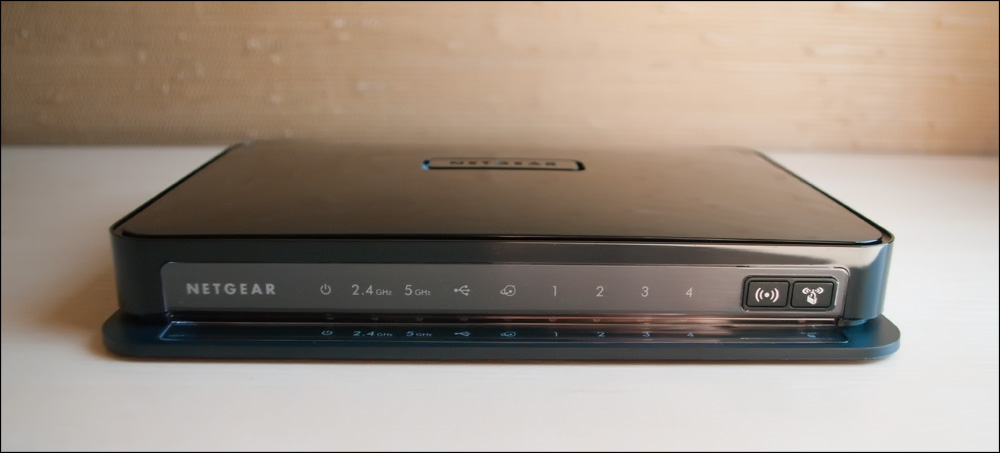
As far as I know, NETGEAR WNDR3700 is still the most (High-Performance) in the arsenal of solutions from NETGEAR - a company specializing in the creation of network devices for various market segments; I even wrote about some of the devices, from a recent one - the Stora network drive (which it was possible to make friends with torrents a couple of days ago).
This model is interesting for many reasons. Firstly, it is relatively expensive and, moreover, rare - due to the fact that it works in two bands (2.4 and 5 GHz), it is not so easy to find it on Russian storefronts. Accordingly, few people managed to test and write about this device, although it definitely deserves attention. Well and the rest - very interesting stuffing, starting from the built-in MIPS-processor with a frequency of 680 MHz, ending with 8 antennas with outstanding speed indicators. In general, my business as always is to show and tell)
')
The router comes in a medium sized box:

The bundle is the most common - the device itself, stand, power adapter, meter patch cord and some pieces of paper in different languages (know rush). Oh, and drive.
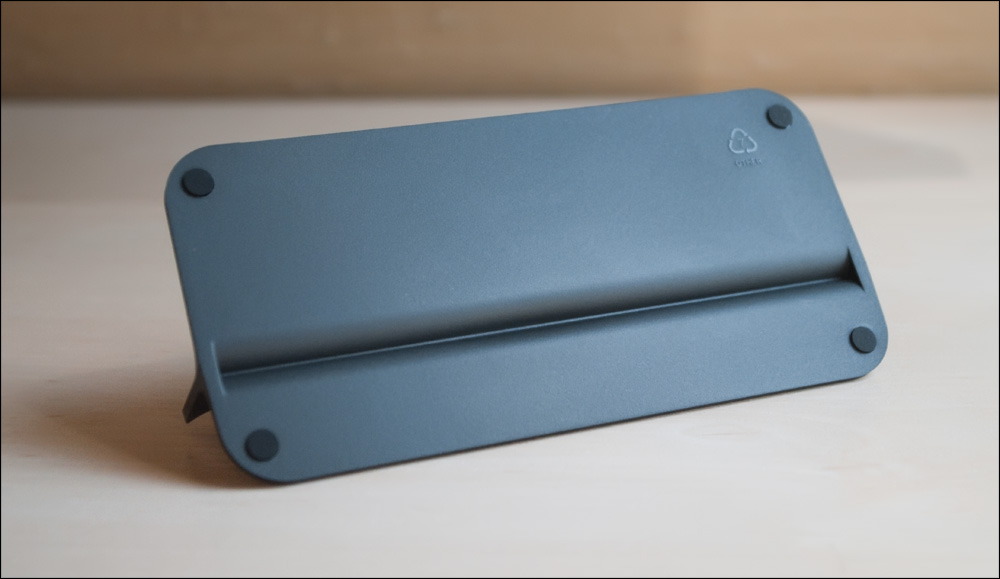
Subjectively, heis terrible beautiful - let's look at this question from 4 sides. On the one hand, the device looks amazing - a black oblong flattened body, on which there is almost nothing superfluous. On the other hand, it is almost completely glossy - for me this is another blow)
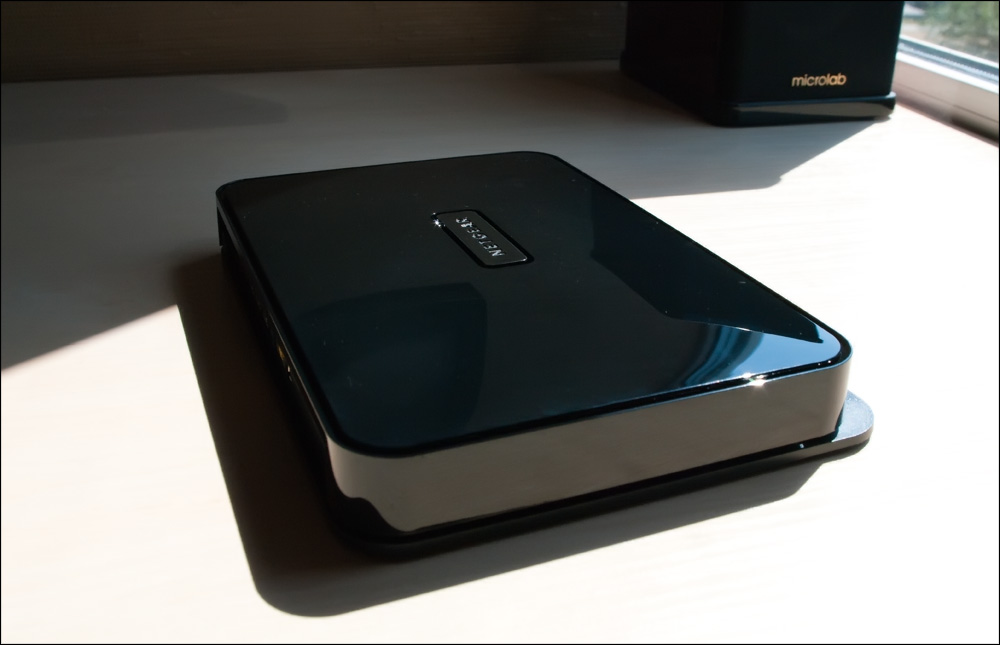
On the third hand, a router is such a thing that can live in a deserted closet, getting along with dust and imprints on the case. On the fourth side, it’s definitely a pity to put such a thing in the closet, and why those extra obstacles on the way to the Internet. In general, my router is still in a relatively visible place, but you need to hide it.
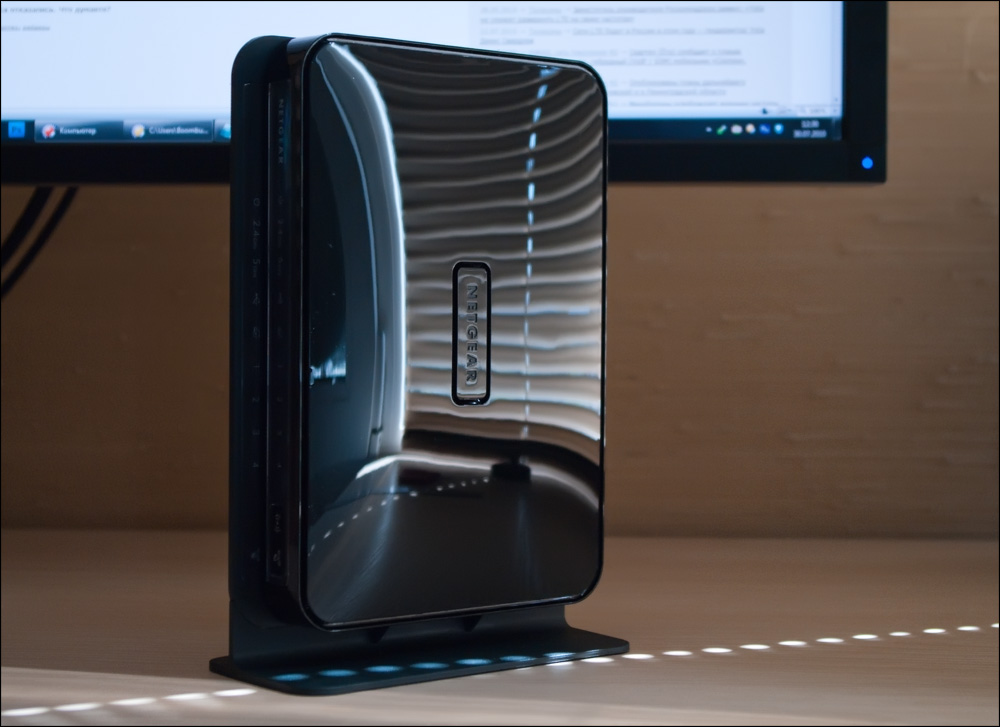
There are at least three mounting options for the device - you can put it on the surface (on the rubber feet); can be put on a stand (which is inserted into the router in a unique way); You can also hang on the wall, for which there are 2 cross-shaped holes in the bottom of the device. Well done, thought out.
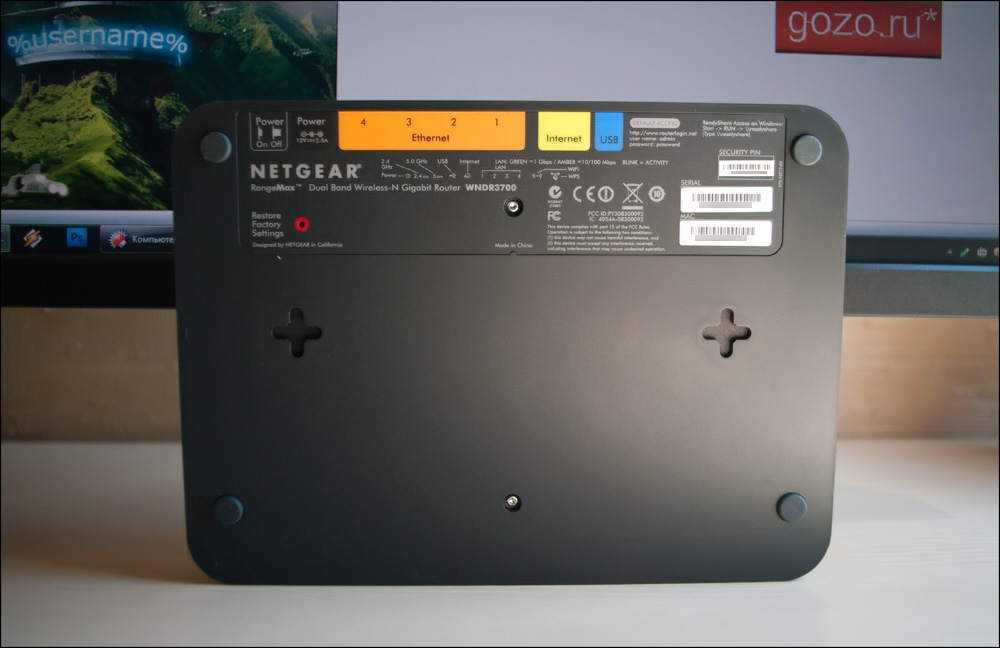
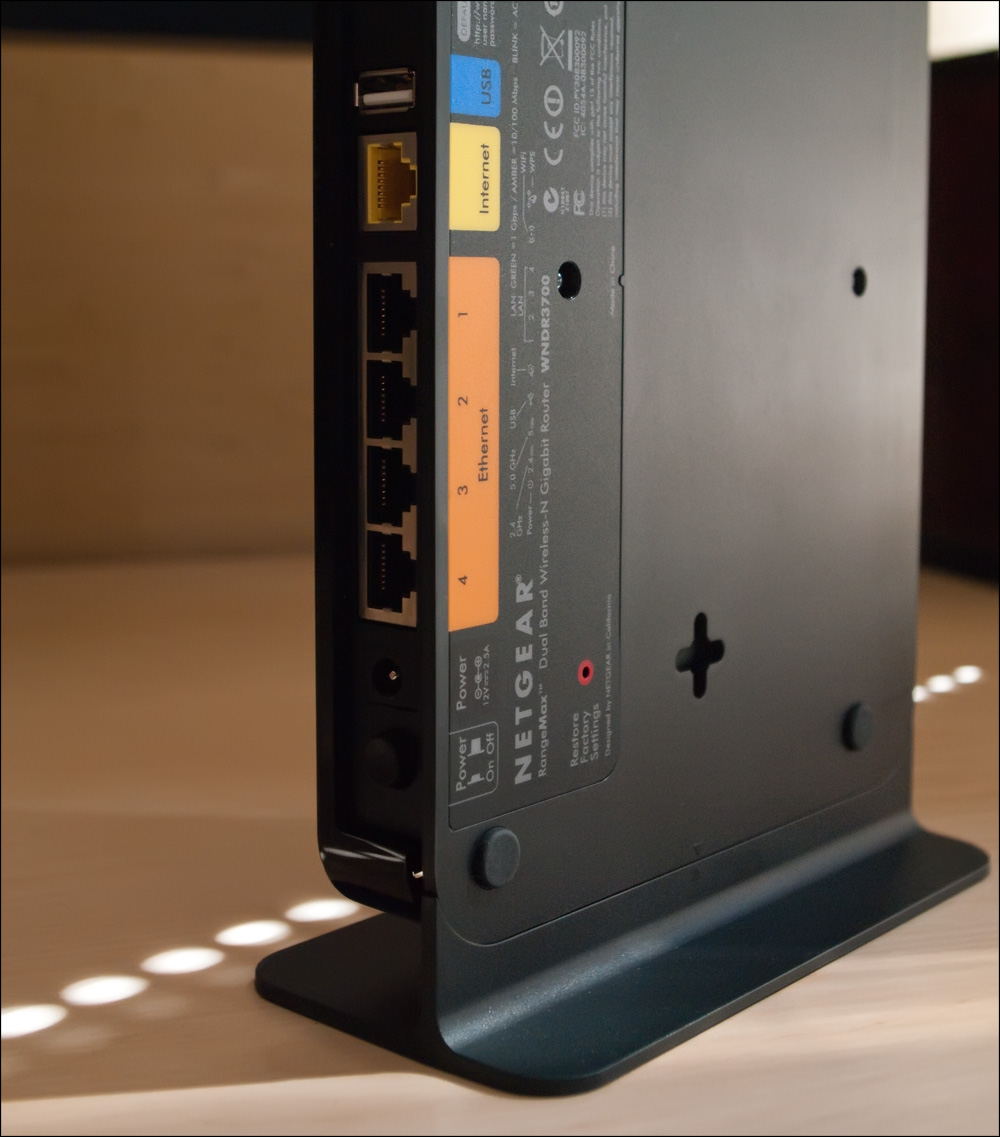
The dimensions are larger than usual (223x153x31 mm) - this is excusable if we consider that external antennas do not stick out of the device. Everything is hidden inside, namely, 8 antennas for two independent radio blocks (two bands - 2.4 and 5 GHz), working in dual channel mode. If desired, you can install 2 external antennas on each radio unit (although you will have to open the case).
On the back side there are 5 network connectors (1xWAN + 4xGigaLAN), 1 USB port, an adapter power hole and a hardware button in the switch (s).

For convenience, there are “legend” of ports at the bottom, some configuration instructions and the “Reset” button (more precisely, Restore Factory Settings).

Now, on the front side, in addition to 9 indicators (1xInet, 4xLAN, 1x2.4GHz, 1x5GHz, 1xUSB, 1xPower), there are two hardware buttons for turning on WPS (Punto tells you that this is a DAC button) and Wi-Fi. You rarely find something like this on devices ... and even immediately you can't think of applying the application. But I still came up with - let's say, let the torrents swing at night due to a wired connection, while Wi-Fi will be unclaimed - why then waste energy (30%), expose the grid to danger and be irradiated once more) I wouldn't bother with the program , but here I clicked and done - perhaps this is just a plus and one more reason not to put the device in the closet.
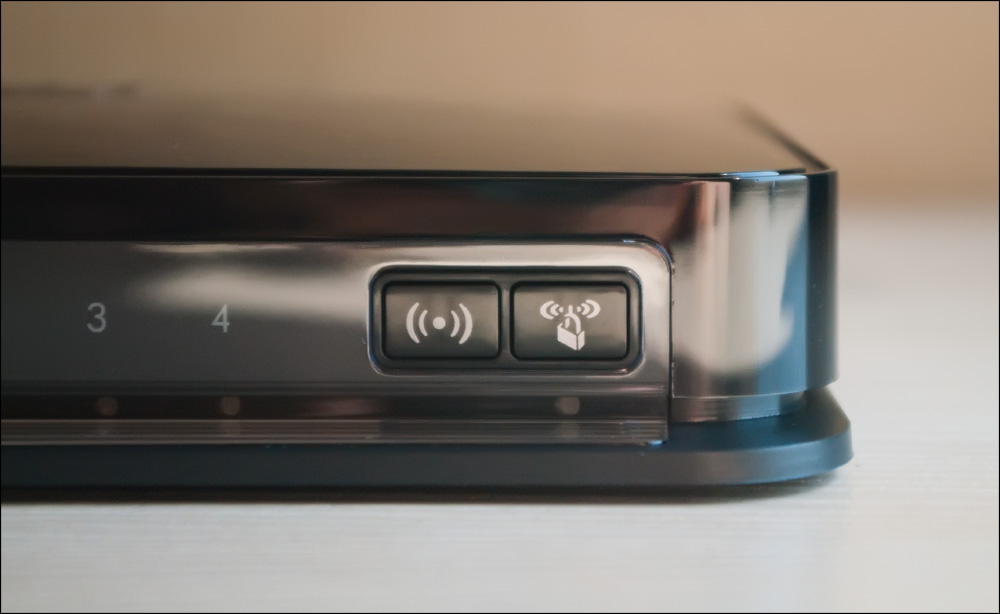
However, “green” technologies are already trying - the wireless network transmitter has three adjustable power levels and signal coverage of the router, which can reduce the wireless network transmitter consumption by up to 75% compared to the full power consumption. Also, the router automatically adjusts something there depending on the cable length, the speed and the number of unused ports.
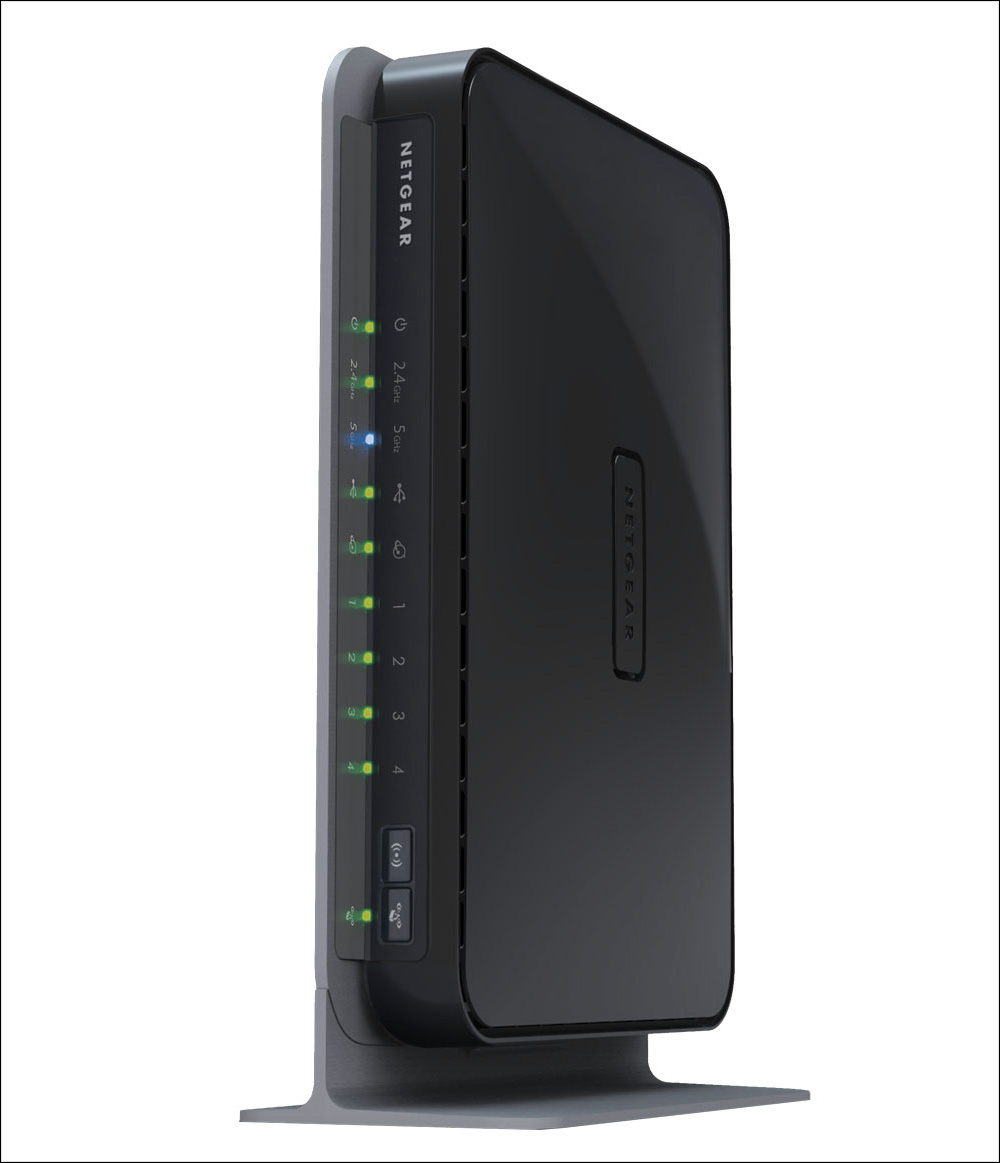
By the thoughtful pleasant little things can be attributed to the L-shaped protrusion in front of the case, through which you can see the status of the LEDs in the case when the router hangs on the wall (they are duplicated). It is inconvenient that it is the LEDs that are lit, and not the corresponding icons and numbers (as in previous models) - you will have to either remember where something is lit, or peer at it each time.
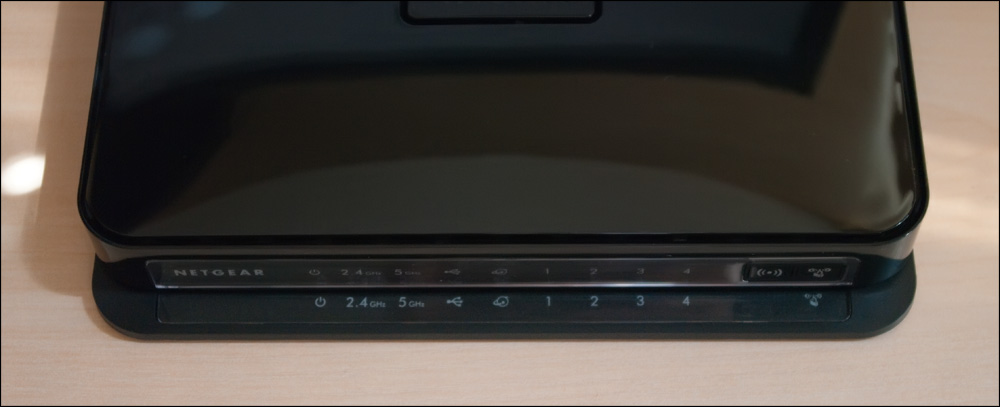
In appearance, perhaps, everything - I connect the wires, press the button and hopefully wait for the flashing LEDs to turn green, according to the "legend".
By the way, the question with the glossy case hastily decided:
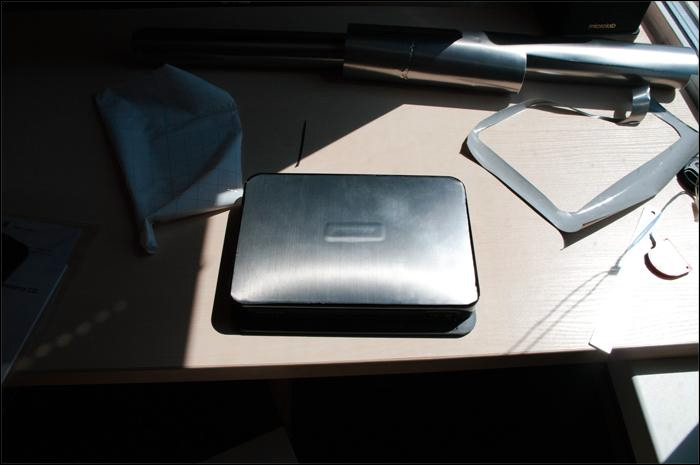
The manufacturer strongly recommends starting with installing the software from the included disk, but I habitually typed 192.168.1.1 in the address bar of the browser and did not lose - the usual invitation appeared. I log in with admin / password and ... oh gods, no! ) The fact of the matter is that there is no - there is no new interface, surprising and alluring! And there is only that anti-interface, which was in all previous models - on frames, with ugly CSS and clumsy (in some places) translation into Russian. It’s a pity, I really hoped to see SOMETHING in the new piece of iron ... well, okay - I got used to this interface from the previous model, and I really only need admin panel for a one-time setup - I made backup settings and forgot.
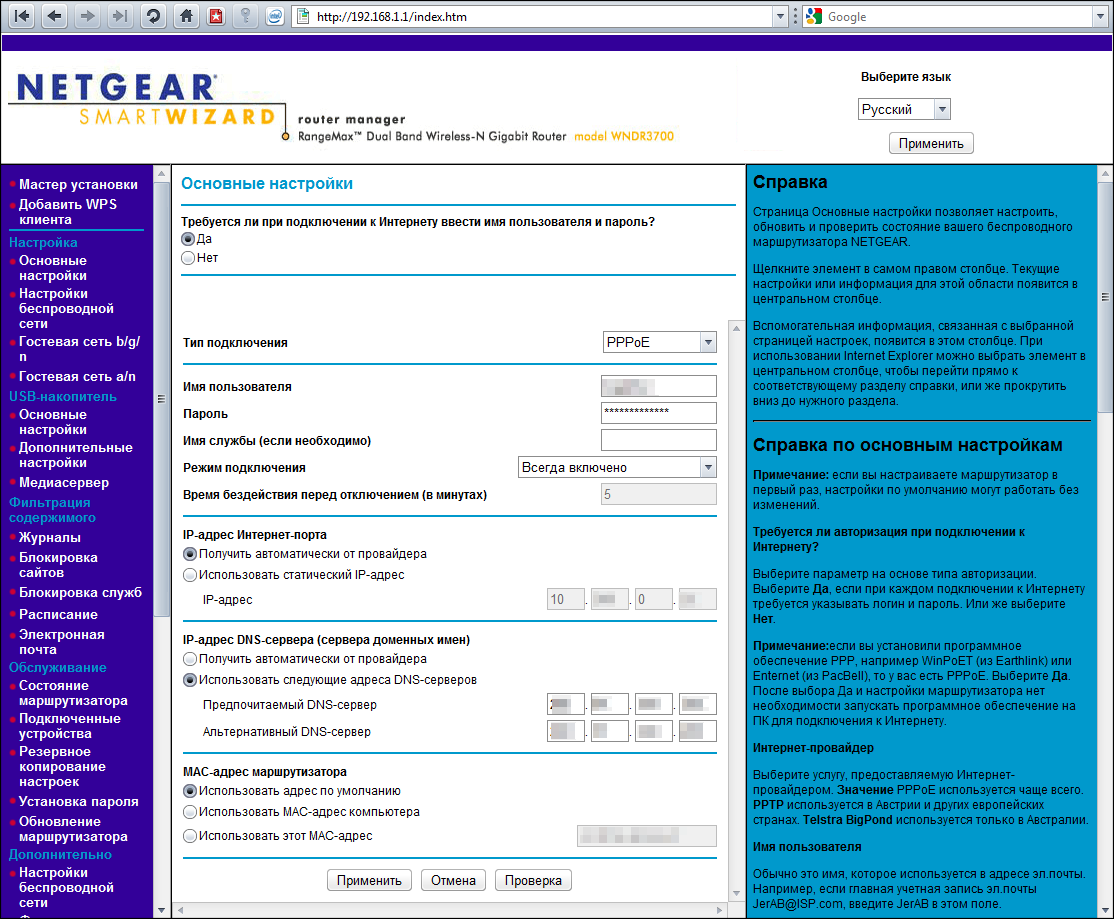
The window is divided into three parts - the left tree menu, the center of the main settings and a detailed description of each option on the right. There are a lot of unusual menu items, about which, unfortunately, I will write only superficially (just lay out the screenshots), because I hardly will use some of them (but if someone is interested in something, write, check).
It all starts with the initial configuration of an Internet. Prudently made screenshots with ip-addresses of a knowingly working configuration so that it does not work out funny (as it sometimes happens to me). I wanted to drive everything right away, as I decided to check the automatic wizard. After a couple of seconds, the device determined that I had a PPPoE connection and, in principle, did everything to get started - it remains to enter the login, password and secret DNS :)
Immediately after saving the settings (and this is the reloading of the page), the router smelled the smell of new firmware on the network and offered to upgrade. Looking around at the list of changes, I decided - a minute later there was a new version.
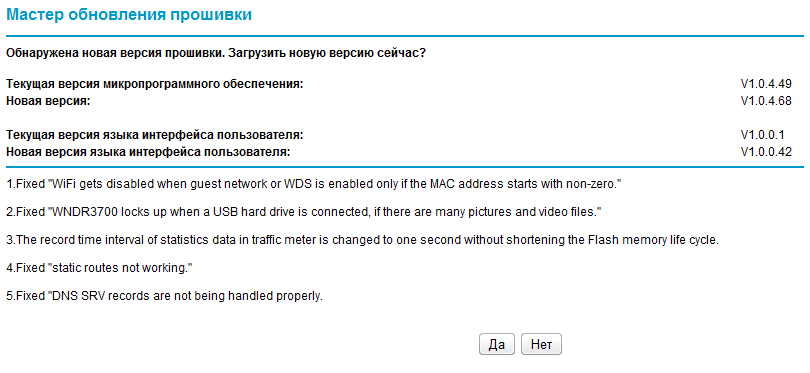
 Setup Wizard
Setup Wizard
This wizard will come to the rescue in the most simple cases, which, most likely, the vast majority.
 Add WPS Client
Add WPS Client
WPS (Wi-Fi Protected Setup, Secure Wi-Fi Setup) allows you to add to a wireless user’s network — without unnecessary trouble such as configuring wireless network settings such as SSID, security mode, and passphrase. There are two options - pressing the button (on the router or in the admin panel) or entering the “PIN code”. But all this is for devices with WPS support, without it you have to do everything by hand.
 basic settings
basic settings
It indicates the type of connection, logins, passwords, addresses, attendances, DNSy and even the MAC address - it can be a factory address, a computer address, or arbitrary.
 Wireless setup
Wireless setup
Now this is more interesting. You can activate both bands - they are divided in the settings into two separate chapters, "2.4GHz b / g / n" and "5GHz a / n". For each separately, you can set the SSID, security mode and key phrase. Wow, that's how I imagined it.
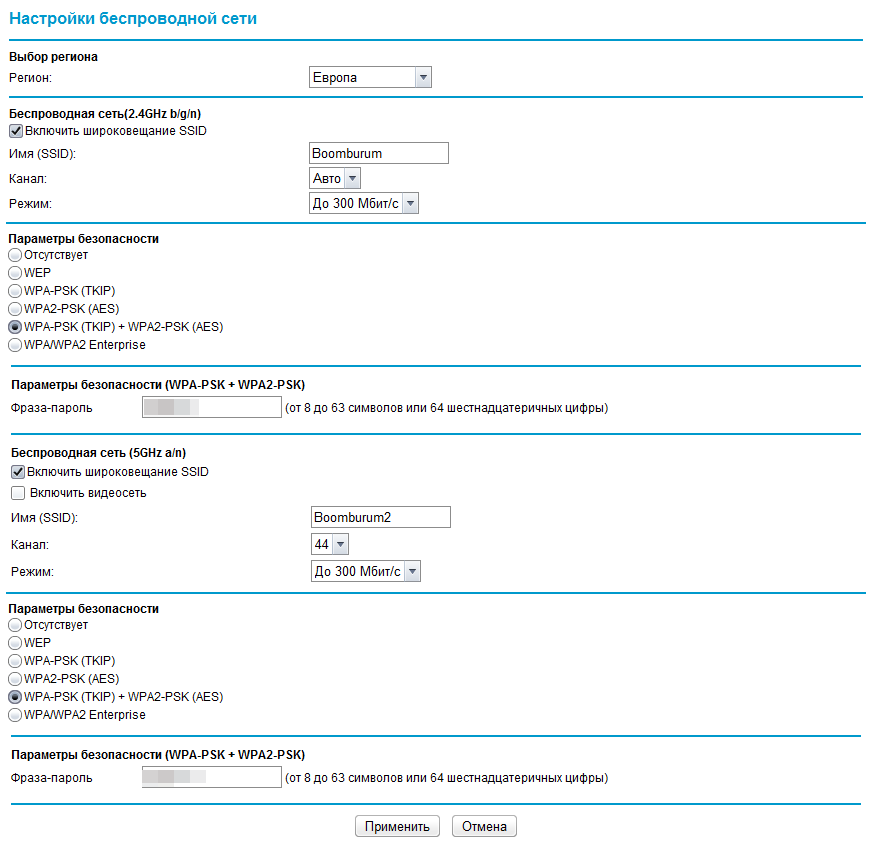
For each of the two networks, a separate item in the menu made it possible to add a guest user - also with the task of security settings, as well as with the ability to log into the local network.
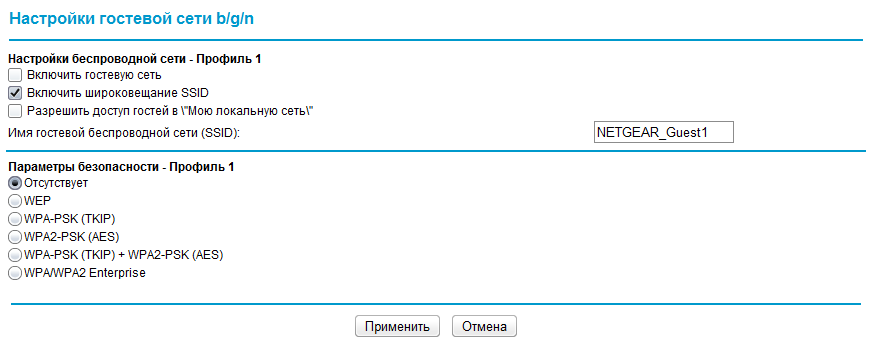
 Basic USB storage settings
Basic USB storage settings
As you may have noticed, there was one USB hole on the case - there I immediately inserted a 500GB portable hard drive, which ... immediately became available in all devices connected to the router!
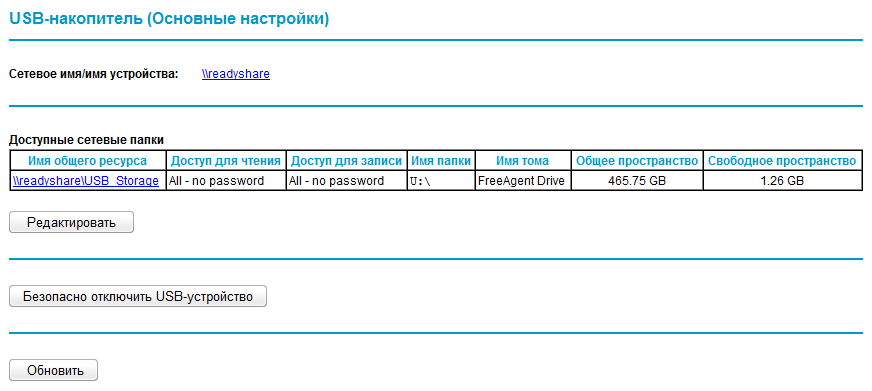
In general, for the file dumps - the most it. The device can be picked up as a network drive - very important for a netbook, the disk space is already over.

By default, the drive is called “ \\ readyshare ” and can be accessed via SMB, FTP, and HTTP (including from the outside). You can play a little with the access rights to different directories of the disk - for example, make some folders “for all”, and some only for yourself (more precisely, for the administrator of the router, you will have to log in using the login information for the admin panel).
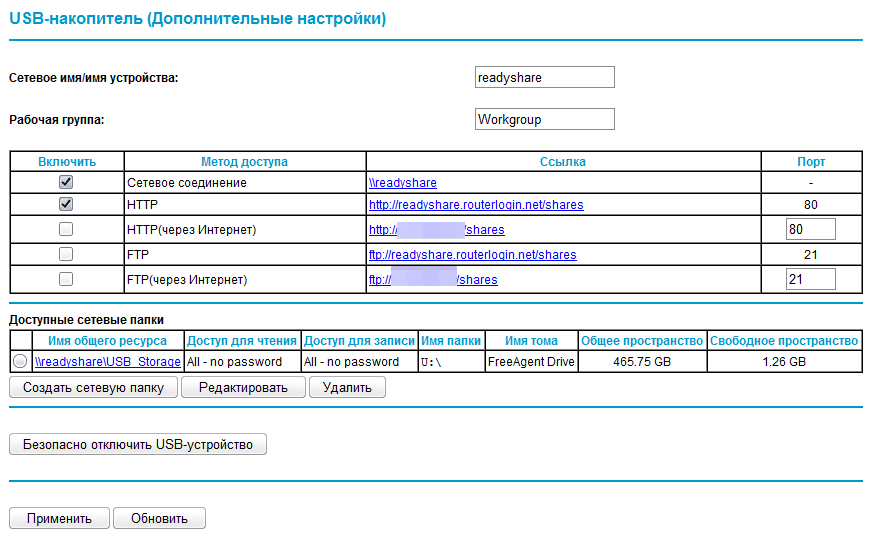
It is possible to be a DLNA-server (with automatic scanning of new files) or UPnP - useful for network media players.
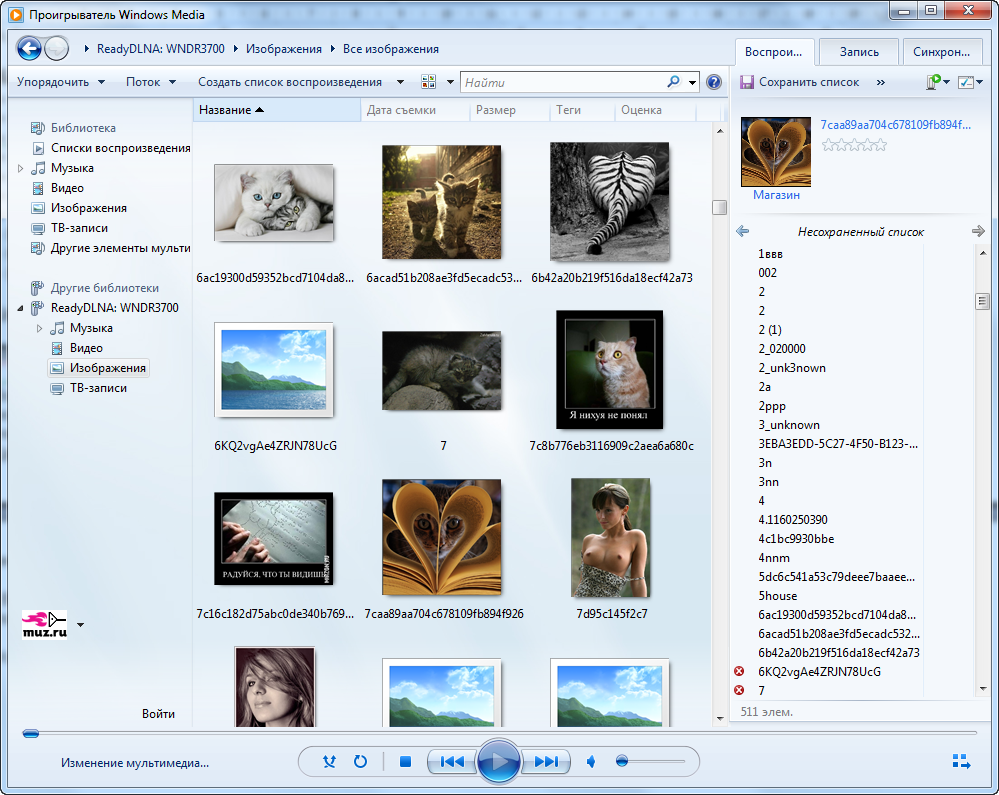
And yes, basic file systems are supported (FAT32, NTFS and EXT2 / 3 - with the ability to write and read), and the devices can work through a USB hub.
 Magazine
Magazine
Dull-looking logs) Shows when someone who and where.
 Blocking sites + Schedule + Email
Blocking sites + Schedule + Email
Block sites by keyword or by IP - can be assigned to individual addresses, for a range or for all. You can primitively adjust the schedule so that the content is blocked, for example, only during working hours. If you wish, you can receive by mail information about who tried to enter a prohibited site and when.
 Router Status
Router Status
It displays all the information on the router (model, firmware, MAC, IP) and its connections. You can view information about connections (who is on which port) and the status of the connection (status, uptime, address).

Next come the menu items for updating the firmware, saving the settings and changing the password (I never found where I could change the administrator’s name from “admin” to something more Bumburum-like — all, when you don’t know your login, not your password, getting into the admin panel is much more difficult).
Below - more flexible wireless settings (again, separately for the two bands).
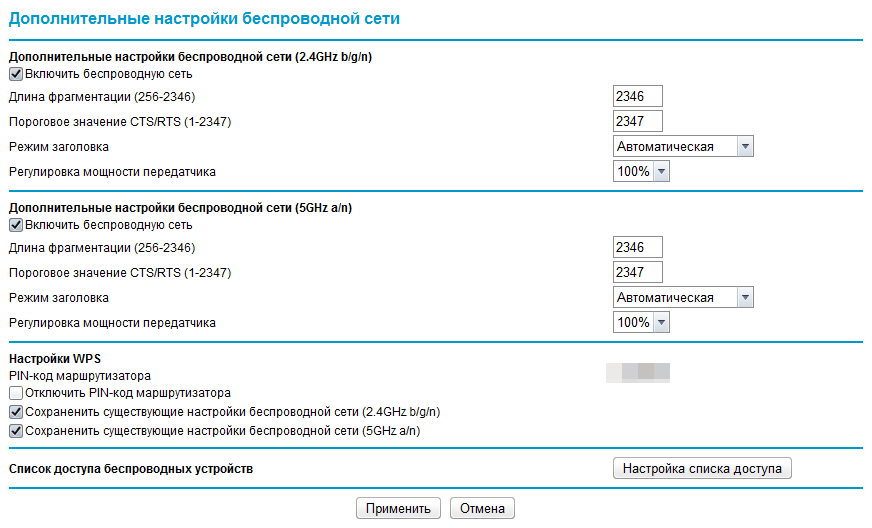
 Wireless relay functions (for both bands) - this is exactly what I need for now. Although ... you can put the old router on the balcony so that the network was also at the entrance - so that you can read twitter from the iPad in still warm evenings, lounging with kvass on the bench) No, I don’t have to say exactly yet. Or maybe…
Wireless relay functions (for both bands) - this is exactly what I need for now. Although ... you can put the old router on the balcony so that the network was also at the entrance - so that you can read twitter from the iPad in still warm evenings, lounging with kvass on the bench) No, I don’t have to say exactly yet. Or maybe…

 Port Forwarding / Port Initiation
Port Forwarding / Port Initiation

Not so long ago, this tab was very important for me - I asked the local provider for a trump port on which I had a small externally accessible HFS server (HTTP File Server) - it was very convenient to share with familiar files and have full control over the process. This is at times cooler than Dropbox, despite the fact that there are no versions of files saved in HFS. But there was a sea of other chips that are not in Dropbox. But, unfortunately, suddenly the port was covered and I didn’t beg again.
 Internet port settings
Internet port settings
Here again, something unnecessary for me - disabling a primitive software firewall, something else there ... well, absolutely for freaks)

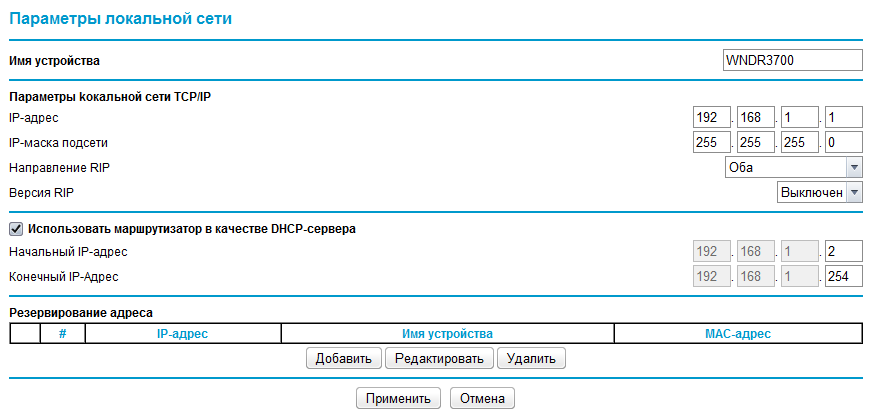
In principle, up to the heap, you can add other two tabs - QoS parameters, dynamic DNS (only DynDNS is supported), static routes and remote control.

 Traffic counter
Traffic counter
This is a useful thing - not only does the traffic count at different time intervals, it can also show warnings (by flashing network indicators, in case the traffic is exceeded - this is important for owners of limit tariffs). I have an unlimited tariff, but before that I did not track traffic. Now look at the end of the month, for the sake of interest.
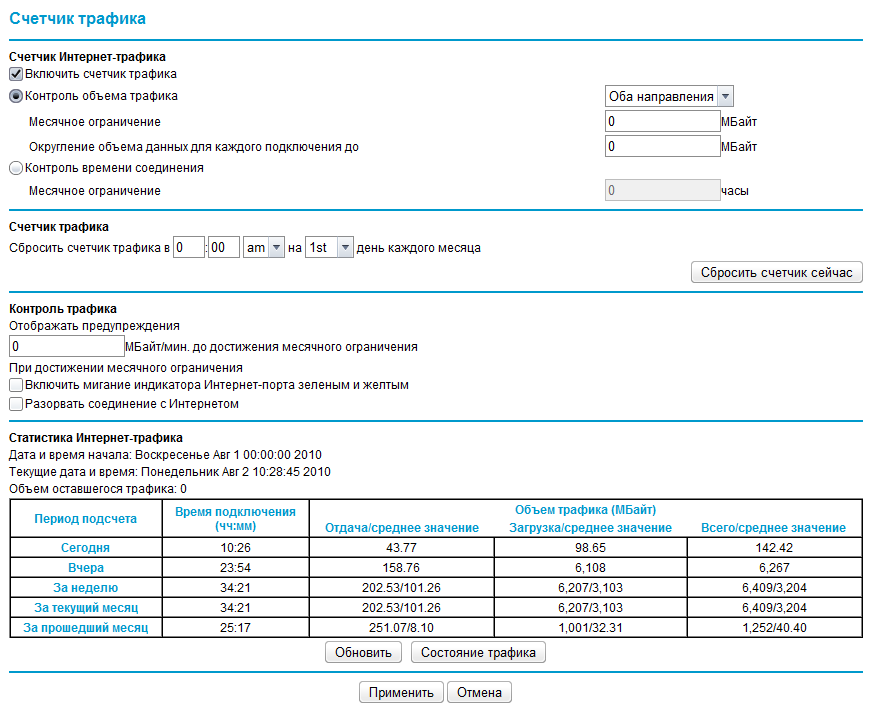
Well that's all. I saved the settings, and at the same time I checked if they fly off when the power is turned off. Do not fly off.
No, not all. For the sake of curiosity, I inserted a disc and found there an amusing program for “parental control”. Of course, my son is still not climbing porn sites, but it was interesting for me to see how such systems work at all - I have never used them before as unnecessary.
In this case, everything happens through the OpenDNS service. If you wish, you can manage the settings through the program (locally), or via the Internet — it takes half a minute to register.
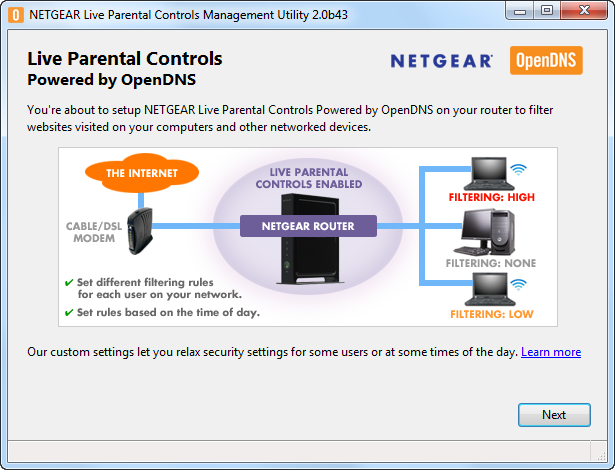
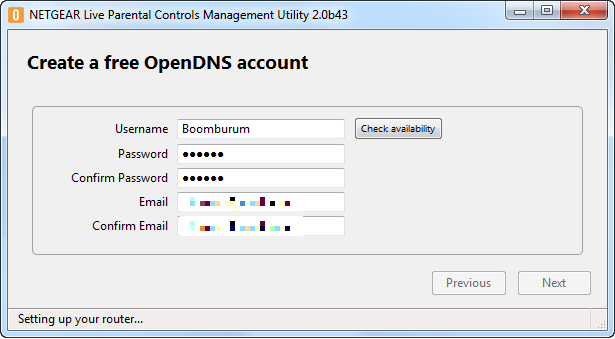
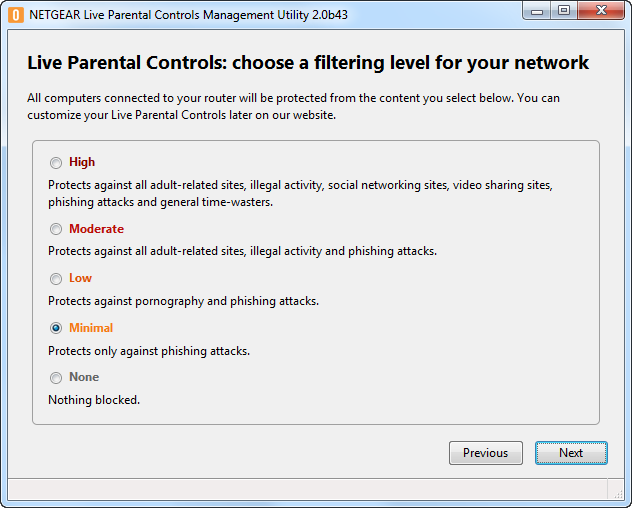
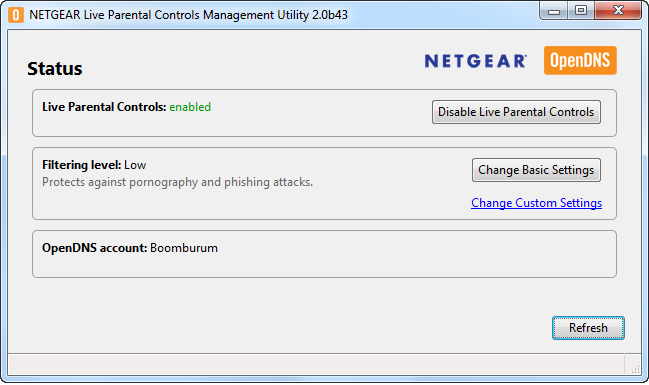
And then everything is simple - you just need to specify the level of "stiffness" of the lock - if in the program this is all implemented primitively, then everything is more than detailed on the site.

So, there are 56 "bad categories", including porn, social networks, phishing sites, etc. And there are several “hardness” levels mentioned above - only phishing sites are blocked on the weakest, and almost everything is severe on the most severe :) There is also a custom mode, when you can limit yourself only from some certain categories - you just have to mention them in the drop down list. And all this can be planned on a beautiful timeline.
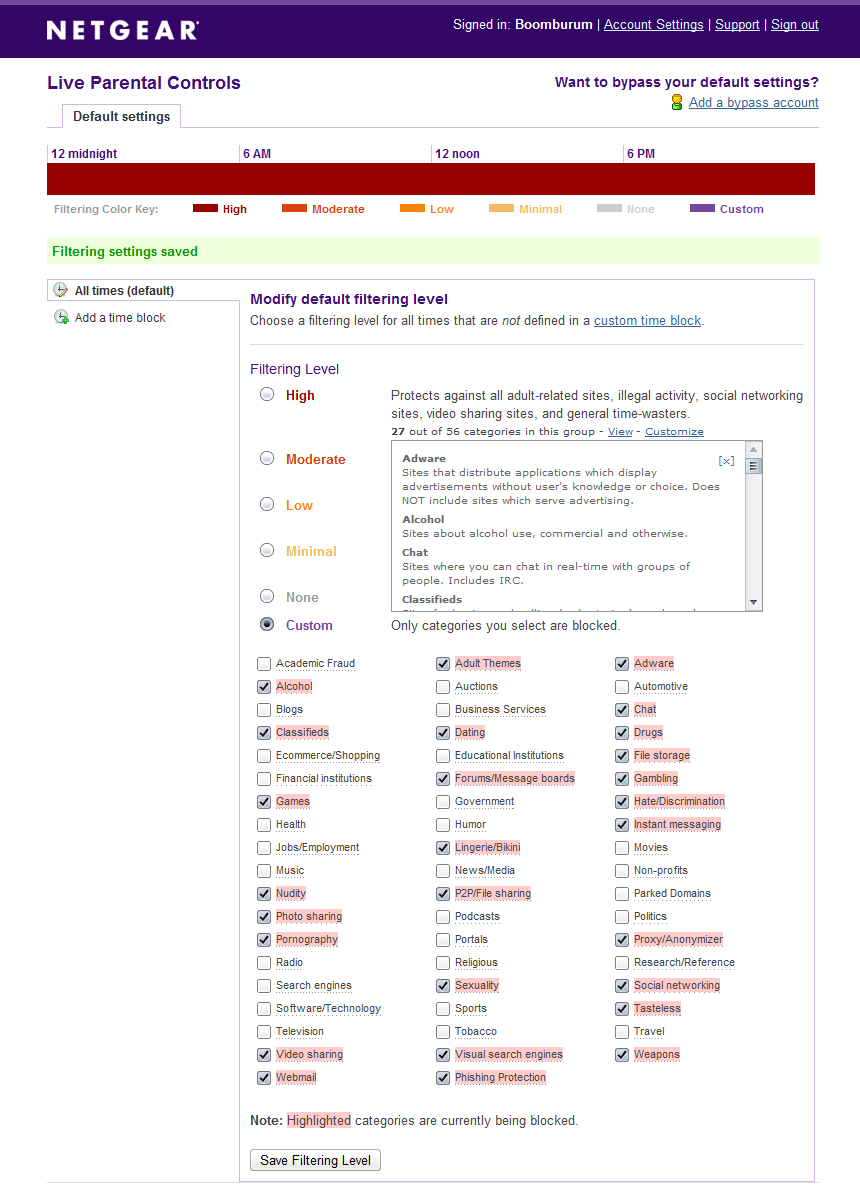
The test showed that the filter is quite edible - in the most severe mode it did not block vkontakte.ru, but vk.com - yes. A couple of clicks in the filter settings - and now it doesn’t cut vkontakte.ru either. Before the naked males too, now not reach - damn, only the whole evening messed up))
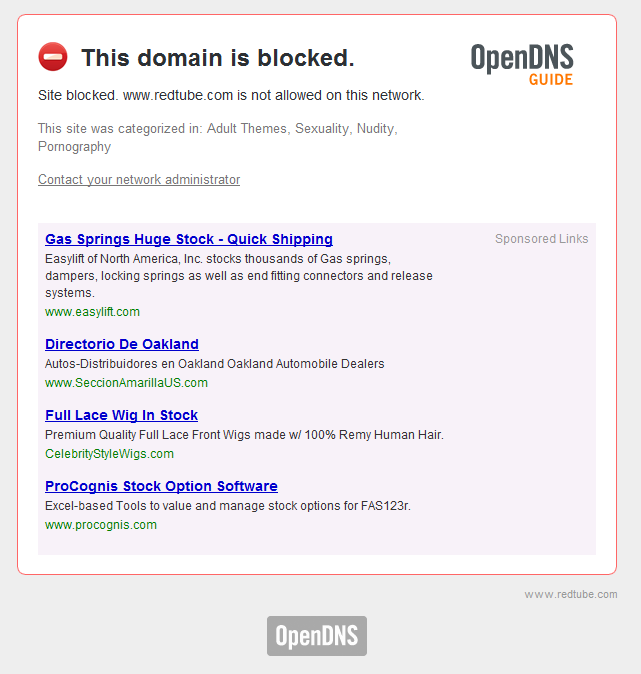
Gogol managed to insert his ad here.
I turned off the filter - I am able to decide for myself what is distracting and what is not, where you can go and where you don’t. But in general, I repeat, the system works.
But most of all I was surprised when I decided to make speed measurements. I will say right away that in this matter I frankly translate a teapot and even megabits into megabytes with a decent delay) But this did not prevent me from using the AIDS test, although some more advanced means could be used.
To begin with, I have an unlimited channel for 30 megabits - it is for such a figure in the contract that I pay 900 rubles per month. These same figures appear on the official website of our local provider - you can be sure.
At first I couldn’t put a new router in any way - I couldn’t stop for 15 minutes, because Internet was constantly needed.

Okay, if you need time - you collected some statistics, because I know that on different days and at different times of the day the speed may change (for example, at night, when many subscribers go to bed). On average, day and night, there were 40 (!) Megabits to download and 15-20 to return. I tried different servers - Moscow, Khimki, Peter - the figure is the same everywhere. An amazing figure, given that it is decently more "documented."
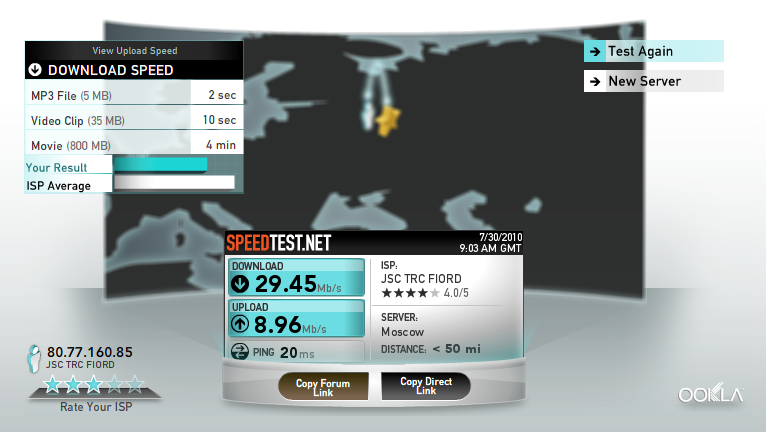
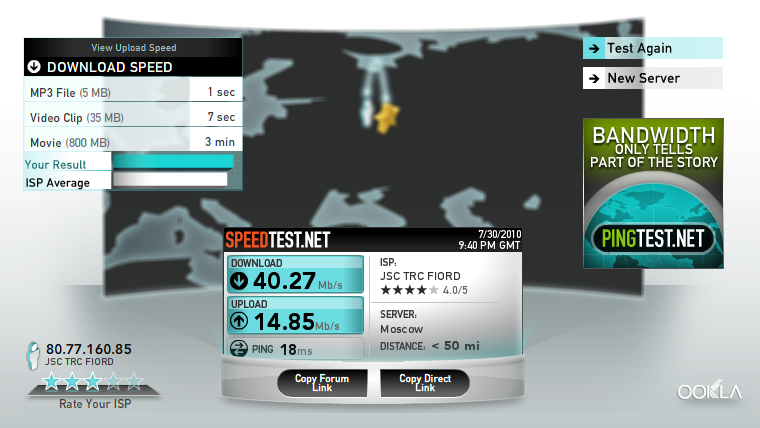
When things were done (it was already night) and I found the same time to put a new router + configure it ... I was surprised even more. The speed at the reception was already 60 (!) Megabits, and the return - up to 50! Having decided that it should not be like this and all this is a night divorce, I decided to wait for the sun to rise — when people would sit down on their Internet sites and block the channels with their bare aunts. But no, 60 megabits still had place to be) So I concluded that the matter, nevertheless, is in the router. And I will believe in it, even if it is not) Whatever it is - I am very much surprised, because the connection speed has actually doubled!
At night:
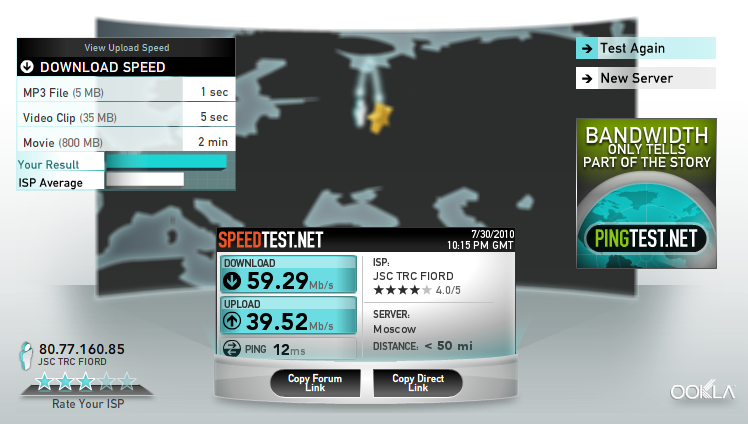
Happy:
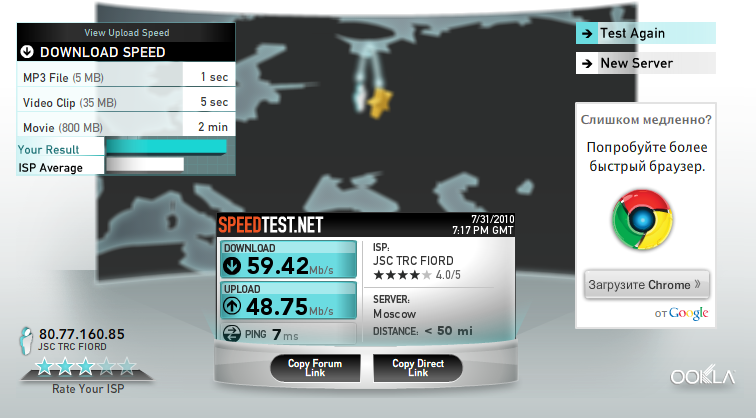
The coverage has become huge - now there are confident “sticks” in the whole apartment. In the farthest place from the router in the apartment, the speedtest on the iPad gives out 25-30 megabits for downloading and 15-18 for feedback. And before that (near the router) there were 20-25 and 10-12, respectively.
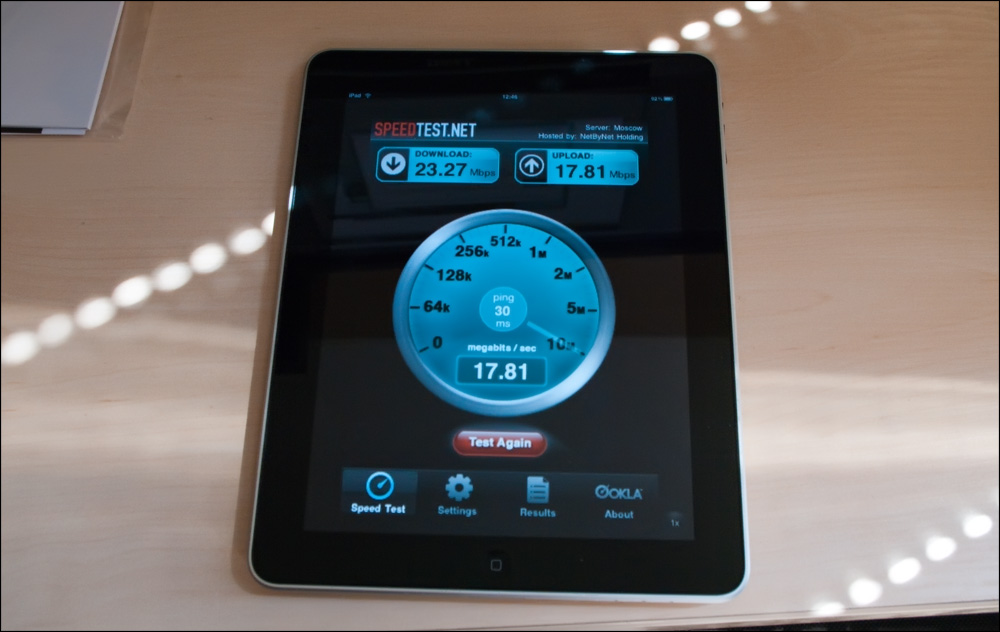
And I didn’t need more - the main thing is that the Internet works. And it works, and very quickly.
For completeness review, I borrow the test results from IXBT:
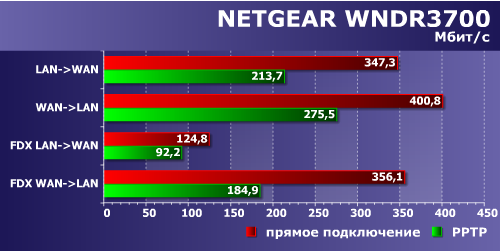
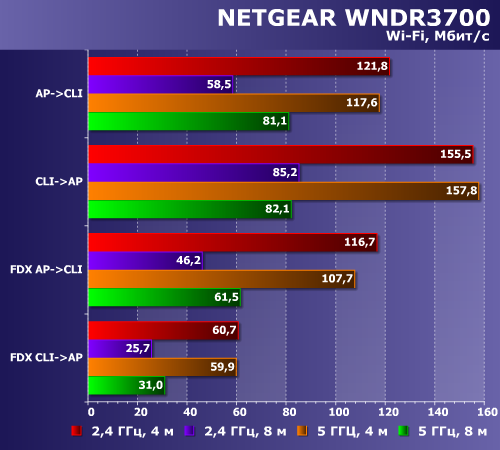
 Advantages and disadvantages
Advantages and disadvantages
 Stylish appearance
Stylish appearance
 Sophisticated design, attention to detail
Sophisticated design, attention to detail
 Multiple mounting options
Multiple mounting options
 Dual band operation
Dual band operation
 High speed
High speed
 Easy but flexible settings
Easy but flexible settings
 USB port, Wi-Fi and WPS buttons
USB port, Wi-Fi and WPS buttons
 "Parental control"
"Parental control"
 Glossy case
Glossy case
 Ugly admin panel
Ugly admin panel
 High price
High price
There is no multicast yet (IPTV flies by), but they promised to attach it in a month or two.
The price at the moment is really high - around 5000-5500r per device.
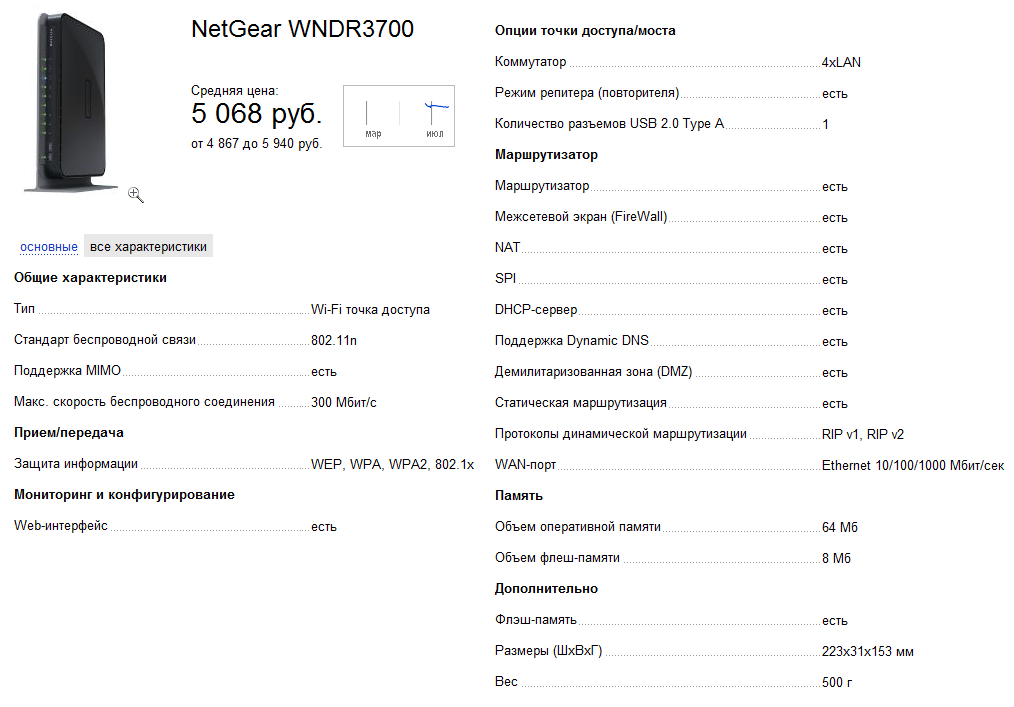
Last year, at CES, the device received the award “Best of Innovation” - in my opinion, more than deserved. At least, now I am extremely pleased with them - besides the fact that he has given a new potential for testing devices with WiFi-n support, he fully satisfies all my “everyday” needs. In addition to the interface and the glossy case, I do not even know what to complain about. Price? Well, yes, it is big, but the router beats it one hundred percent. By the way, there are rumors that work on the interface is in full swing and I hope this model will not be left behind.
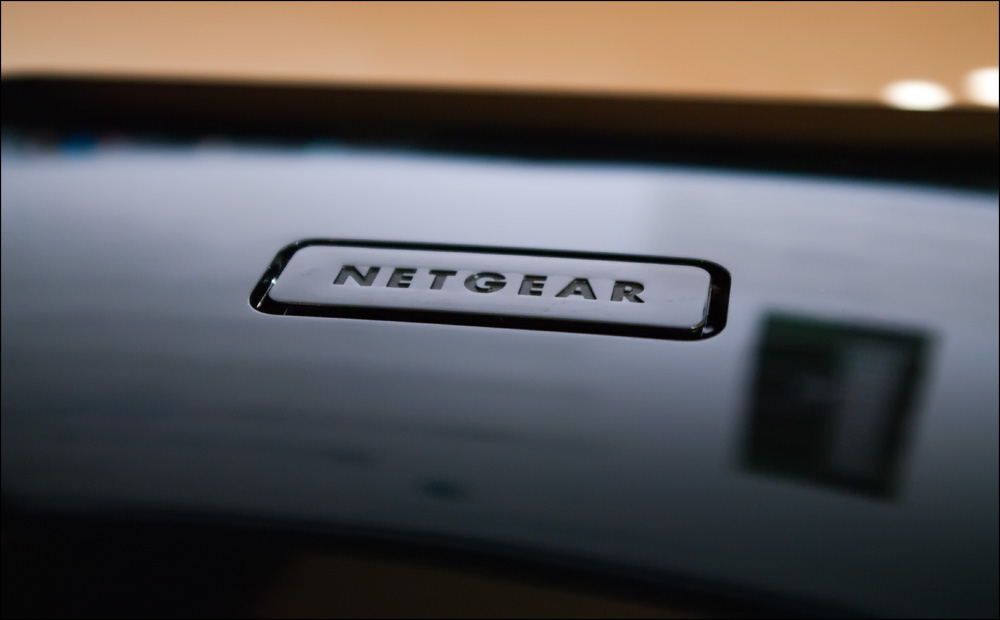
In general, if you need a really good router, then I can advise NETGEAR WNDR3700 with a clear conscience.
Successes. Come on autocadaboo tonight ;)

As far as I know, NETGEAR WNDR3700 is still the most (High-Performance) in the arsenal of solutions from NETGEAR - a company specializing in the creation of network devices for various market segments; I even wrote about some of the devices, from a recent one - the Stora network drive (which it was possible to make friends with torrents a couple of days ago).
This model is interesting for many reasons. Firstly, it is relatively expensive and, moreover, rare - due to the fact that it works in two bands (2.4 and 5 GHz), it is not so easy to find it on Russian storefronts. Accordingly, few people managed to test and write about this device, although it definitely deserves attention. Well and the rest - very interesting stuffing, starting from the built-in MIPS-processor with a frequency of 680 MHz, ending with 8 antennas with outstanding speed indicators. In general, my business as always is to show and tell)
')
The router comes in a medium sized box:

The bundle is the most common - the device itself, stand, power adapter, meter patch cord and some pieces of paper in different languages (know rush). Oh, and drive.

Appearance
Subjectively, he

On the third hand, a router is such a thing that can live in a deserted closet, getting along with dust and imprints on the case. On the fourth side, it’s definitely a pity to put such a thing in the closet, and why those extra obstacles on the way to the Internet. In general, my router is still in a relatively visible place, but you need to hide it.

There are at least three mounting options for the device - you can put it on the surface (on the rubber feet); can be put on a stand (which is inserted into the router in a unique way); You can also hang on the wall, for which there are 2 cross-shaped holes in the bottom of the device. Well done, thought out.


The dimensions are larger than usual (223x153x31 mm) - this is excusable if we consider that external antennas do not stick out of the device. Everything is hidden inside, namely, 8 antennas for two independent radio blocks (two bands - 2.4 and 5 GHz), working in dual channel mode. If desired, you can install 2 external antennas on each radio unit (although you will have to open the case).
On the back side there are 5 network connectors (1xWAN + 4xGigaLAN), 1 USB port, an adapter power hole and a hardware button in the switch (s).

For convenience, there are “legend” of ports at the bottom, some configuration instructions and the “Reset” button (more precisely, Restore Factory Settings).

Now, on the front side, in addition to 9 indicators (1xInet, 4xLAN, 1x2.4GHz, 1x5GHz, 1xUSB, 1xPower), there are two hardware buttons for turning on WPS (Punto tells you that this is a DAC button) and Wi-Fi. You rarely find something like this on devices ... and even immediately you can't think of applying the application. But I still came up with - let's say, let the torrents swing at night due to a wired connection, while Wi-Fi will be unclaimed - why then waste energy (30%), expose the grid to danger and be irradiated once more) I wouldn't bother with the program , but here I clicked and done - perhaps this is just a plus and one more reason not to put the device in the closet.

However, “green” technologies are already trying - the wireless network transmitter has three adjustable power levels and signal coverage of the router, which can reduce the wireless network transmitter consumption by up to 75% compared to the full power consumption. Also, the router automatically adjusts something there depending on the cable length, the speed and the number of unused ports.

By the thoughtful pleasant little things can be attributed to the L-shaped protrusion in front of the case, through which you can see the status of the LEDs in the case when the router hangs on the wall (they are duplicated). It is inconvenient that it is the LEDs that are lit, and not the corresponding icons and numbers (as in previous models) - you will have to either remember where something is lit, or peer at it each time.

In appearance, perhaps, everything - I connect the wires, press the button and hopefully wait for the flashing LEDs to turn green, according to the "legend".
By the way, the question with the glossy case hastily decided:

Settings
The manufacturer strongly recommends starting with installing the software from the included disk, but I habitually typed 192.168.1.1 in the address bar of the browser and did not lose - the usual invitation appeared. I log in with admin / password and ... oh gods, no! ) The fact of the matter is that there is no - there is no new interface, surprising and alluring! And there is only that anti-interface, which was in all previous models - on frames, with ugly CSS and clumsy (in some places) translation into Russian. It’s a pity, I really hoped to see SOMETHING in the new piece of iron ... well, okay - I got used to this interface from the previous model, and I really only need admin panel for a one-time setup - I made backup settings and forgot.

The window is divided into three parts - the left tree menu, the center of the main settings and a detailed description of each option on the right. There are a lot of unusual menu items, about which, unfortunately, I will write only superficially (just lay out the screenshots), because I hardly will use some of them (but if someone is interested in something, write, check).
It all starts with the initial configuration of an Internet. Prudently made screenshots with ip-addresses of a knowingly working configuration so that it does not work out funny (as it sometimes happens to me). I wanted to drive everything right away, as I decided to check the automatic wizard. After a couple of seconds, the device determined that I had a PPPoE connection and, in principle, did everything to get started - it remains to enter the login, password and secret DNS :)
Immediately after saving the settings (and this is the reloading of the page), the router smelled the smell of new firmware on the network and offered to upgrade. Looking around at the list of changes, I decided - a minute later there was a new version.

 Setup Wizard
Setup WizardThis wizard will come to the rescue in the most simple cases, which, most likely, the vast majority.
 Add WPS Client
Add WPS ClientWPS (Wi-Fi Protected Setup, Secure Wi-Fi Setup) allows you to add to a wireless user’s network — without unnecessary trouble such as configuring wireless network settings such as SSID, security mode, and passphrase. There are two options - pressing the button (on the router or in the admin panel) or entering the “PIN code”. But all this is for devices with WPS support, without it you have to do everything by hand.
 basic settings
basic settingsIt indicates the type of connection, logins, passwords, addresses, attendances, DNSy and even the MAC address - it can be a factory address, a computer address, or arbitrary.
 Wireless setup
Wireless setupNow this is more interesting. You can activate both bands - they are divided in the settings into two separate chapters, "2.4GHz b / g / n" and "5GHz a / n". For each separately, you can set the SSID, security mode and key phrase. Wow, that's how I imagined it.

For each of the two networks, a separate item in the menu made it possible to add a guest user - also with the task of security settings, as well as with the ability to log into the local network.

 Basic USB storage settings
Basic USB storage settingsAs you may have noticed, there was one USB hole on the case - there I immediately inserted a 500GB portable hard drive, which ... immediately became available in all devices connected to the router!

In general, for the file dumps - the most it. The device can be picked up as a network drive - very important for a netbook, the disk space is already over.

By default, the drive is called “ \\ readyshare ” and can be accessed via SMB, FTP, and HTTP (including from the outside). You can play a little with the access rights to different directories of the disk - for example, make some folders “for all”, and some only for yourself (more precisely, for the administrator of the router, you will have to log in using the login information for the admin panel).

It is possible to be a DLNA-server (with automatic scanning of new files) or UPnP - useful for network media players.

And yes, basic file systems are supported (FAT32, NTFS and EXT2 / 3 - with the ability to write and read), and the devices can work through a USB hub.
 Magazine
MagazineDull-looking logs) Shows when someone who and where.
 Blocking sites + Schedule + Email
Blocking sites + Schedule + EmailBlock sites by keyword or by IP - can be assigned to individual addresses, for a range or for all. You can primitively adjust the schedule so that the content is blocked, for example, only during working hours. If you wish, you can receive by mail information about who tried to enter a prohibited site and when.
 Router Status
Router StatusIt displays all the information on the router (model, firmware, MAC, IP) and its connections. You can view information about connections (who is on which port) and the status of the connection (status, uptime, address).

Next come the menu items for updating the firmware, saving the settings and changing the password (I never found where I could change the administrator’s name from “admin” to something more Bumburum-like — all, when you don’t know your login, not your password, getting into the admin panel is much more difficult).
Below - more flexible wireless settings (again, separately for the two bands).

 Wireless relay functions (for both bands) - this is exactly what I need for now. Although ... you can put the old router on the balcony so that the network was also at the entrance - so that you can read twitter from the iPad in still warm evenings, lounging with kvass on the bench) No, I don’t have to say exactly yet. Or maybe…
Wireless relay functions (for both bands) - this is exactly what I need for now. Although ... you can put the old router on the balcony so that the network was also at the entrance - so that you can read twitter from the iPad in still warm evenings, lounging with kvass on the bench) No, I don’t have to say exactly yet. Or maybe…
 Port Forwarding / Port Initiation
Port Forwarding / Port Initiation
Not so long ago, this tab was very important for me - I asked the local provider for a trump port on which I had a small externally accessible HFS server (HTTP File Server) - it was very convenient to share with familiar files and have full control over the process. This is at times cooler than Dropbox, despite the fact that there are no versions of files saved in HFS. But there was a sea of other chips that are not in Dropbox. But, unfortunately, suddenly the port was covered and I didn’t beg again.
 Internet port settings
Internet port settingsHere again, something unnecessary for me - disabling a primitive software firewall, something else there ... well, absolutely for freaks)


In principle, up to the heap, you can add other two tabs - QoS parameters, dynamic DNS (only DynDNS is supported), static routes and remote control.

 Traffic counter
Traffic counterThis is a useful thing - not only does the traffic count at different time intervals, it can also show warnings (by flashing network indicators, in case the traffic is exceeded - this is important for owners of limit tariffs). I have an unlimited tariff, but before that I did not track traffic. Now look at the end of the month, for the sake of interest.

Well that's all. I saved the settings, and at the same time I checked if they fly off when the power is turned off. Do not fly off.
No, not all. For the sake of curiosity, I inserted a disc and found there an amusing program for “parental control”. Of course, my son is still not climbing porn sites, but it was interesting for me to see how such systems work at all - I have never used them before as unnecessary.
In this case, everything happens through the OpenDNS service. If you wish, you can manage the settings through the program (locally), or via the Internet — it takes half a minute to register.




And then everything is simple - you just need to specify the level of "stiffness" of the lock - if in the program this is all implemented primitively, then everything is more than detailed on the site.

So, there are 56 "bad categories", including porn, social networks, phishing sites, etc. And there are several “hardness” levels mentioned above - only phishing sites are blocked on the weakest, and almost everything is severe on the most severe :) There is also a custom mode, when you can limit yourself only from some certain categories - you just have to mention them in the drop down list. And all this can be planned on a beautiful timeline.

The test showed that the filter is quite edible - in the most severe mode it did not block vkontakte.ru, but vk.com - yes. A couple of clicks in the filter settings - and now it doesn’t cut vkontakte.ru either. Before the naked males too, now not reach - damn, only the whole evening messed up))

Gogol managed to insert his ad here.
I turned off the filter - I am able to decide for myself what is distracting and what is not, where you can go and where you don’t. But in general, I repeat, the system works.
Field of Dreams
But most of all I was surprised when I decided to make speed measurements. I will say right away that in this matter I frankly translate a teapot and even megabits into megabytes with a decent delay) But this did not prevent me from using the AIDS test, although some more advanced means could be used.
To begin with, I have an unlimited channel for 30 megabits - it is for such a figure in the contract that I pay 900 rubles per month. These same figures appear on the official website of our local provider - you can be sure.
At first I couldn’t put a new router in any way - I couldn’t stop for 15 minutes, because Internet was constantly needed.

Okay, if you need time - you collected some statistics, because I know that on different days and at different times of the day the speed may change (for example, at night, when many subscribers go to bed). On average, day and night, there were 40 (!) Megabits to download and 15-20 to return. I tried different servers - Moscow, Khimki, Peter - the figure is the same everywhere. An amazing figure, given that it is decently more "documented."


When things were done (it was already night) and I found the same time to put a new router + configure it ... I was surprised even more. The speed at the reception was already 60 (!) Megabits, and the return - up to 50! Having decided that it should not be like this and all this is a night divorce, I decided to wait for the sun to rise — when people would sit down on their Internet sites and block the channels with their bare aunts. But no, 60 megabits still had place to be) So I concluded that the matter, nevertheless, is in the router. And I will believe in it, even if it is not) Whatever it is - I am very much surprised, because the connection speed has actually doubled!
At night:

Happy:

The coverage has become huge - now there are confident “sticks” in the whole apartment. In the farthest place from the router in the apartment, the speedtest on the iPad gives out 25-30 megabits for downloading and 15-18 for feedback. And before that (near the router) there were 20-25 and 10-12, respectively.

And I didn’t need more - the main thing is that the Internet works. And it works, and very quickly.
For completeness review, I borrow the test results from IXBT:


 Advantages and disadvantages
Advantages and disadvantages Stylish appearance
Stylish appearance Sophisticated design, attention to detail
Sophisticated design, attention to detail Multiple mounting options
Multiple mounting options Dual band operation
Dual band operation High speed
High speed Easy but flexible settings
Easy but flexible settings USB port, Wi-Fi and WPS buttons
USB port, Wi-Fi and WPS buttons "Parental control"
"Parental control" Glossy case
Glossy case Ugly admin panel
Ugly admin panel High price
High priceThere is no multicast yet (IPTV flies by), but they promised to attach it in a month or two.
The price at the moment is really high - around 5000-5500r per device.

The end
Last year, at CES, the device received the award “Best of Innovation” - in my opinion, more than deserved. At least, now I am extremely pleased with them - besides the fact that he has given a new potential for testing devices with WiFi-n support, he fully satisfies all my “everyday” needs. In addition to the interface and the glossy case, I do not even know what to complain about. Price? Well, yes, it is big, but the router beats it one hundred percent. By the way, there are rumors that work on the interface is in full swing and I hope this model will not be left behind.

In general, if you need a really good router, then I can advise NETGEAR WNDR3700 with a clear conscience.
Successes. Come on autocadaboo tonight ;)
Source: https://habr.com/ru/post/100767/
All Articles